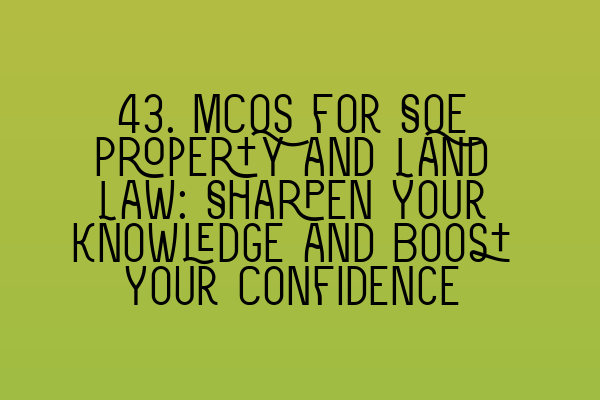43 MCQs for SQE Property and Land Law: Sharpen Your Knowledge and Boost Your Confidence
As an aspiring solicitor, having a strong understanding of property and land law is essential. Whether you are preparing for the Solicitors Qualifying Exam (SQE) or looking to brush up on your knowledge, this blog post is here to help. We have compiled a list of 43 multiple-choice questions (MCQs) that cover a range of topics in property and land law. These questions are designed to test your knowledge, challenge your understanding, and help you identify any areas that may need additional study.
Before we dive into the MCQs, let’s take a moment to discuss the importance of practicing MCQs in your exam preparation. MCQs are a valuable tool for several reasons. Firstly, they help you assess your understanding of the subject matter. By attempting MCQs, you can gauge how well you have grasped the key concepts and identify any areas of weakness. Secondly, MCQs help you become familiar with the exam format and structure. The SQE exams include MCQ sections, so practicing these questions will give you a sense of what to expect on the day of the exam. Lastly, practicing MCQs improves your speed, accuracy, and confidence. By repeatedly answering MCQs, you will become more efficient at analyzing and selecting the correct answers.
MCQ Practice Quiz
Now let’s move on to the MCQs! Remember to approach each question thoughtfully and read all options before selecting your answer. Test yourself and see how many you can answer correctly. Good luck!
- Which of the following is NOT a type of ownership interest in land?
- A. Freehold
- B. Leasehold
- C. Easement
- D. Fee simple absolute
- What is the primary purpose of the Land Registry in England and Wales?
- A. To oversee property transactions
- B. To maintain property boundaries
- C. To register and record land ownership
- D. To resolve land disputes
- Which of the following is NOT a requirement for a valid contract for the sale of land?
- A. Offer and acceptance
- B. Consideration
- C. Written agreement
- D. Intention to create legal relations
- What is adverse possession?
- A. The process of acquiring land through a will
- B. The legal term for renting out property
- C. The occupation of land without the owner’s permission
- D. The transfer of property between family members
- Which of the following is an easement?
- A. A right to occupy a property for a specific period of time
- B. A right of way over a neighbor’s land
- C. A transfer of land ownership
- D. A restrictive covenant
- What is the purpose of a mortgage?
- A. To transfer ownership of a property
- B. To create an easement
- C. To secure a loan using property as collateral
- D. To lease a property for a fixed term
We’ve barely scratched the surface with these six questions. If you want to test your knowledge further and explore more MCQs on property and land law, be sure to check out our related articles:
- SQE 1 Practice Exam Questions
- SQE 1 Practice Mocks FLK1 FLK2
- SQE 2 Preparation Courses
- SQE 1 Preparation Courses
- SRA SQE Exam Dates
By exploring these resources, you can enhance your understanding, build confidence, and ensure you are fully prepared for your property and land law exams. Remember, consistent practice, thorough revision, and a deep understanding of the subject matter are key to success.
We hope you found this MCQ practice blog post helpful. If you have any questions or need further guidance, don’t hesitate to reach out to us at SQE Property Law & Land Law. Our team of expert solicitors is here to assist you in your legal journey. Good luck with your studies and exams!
